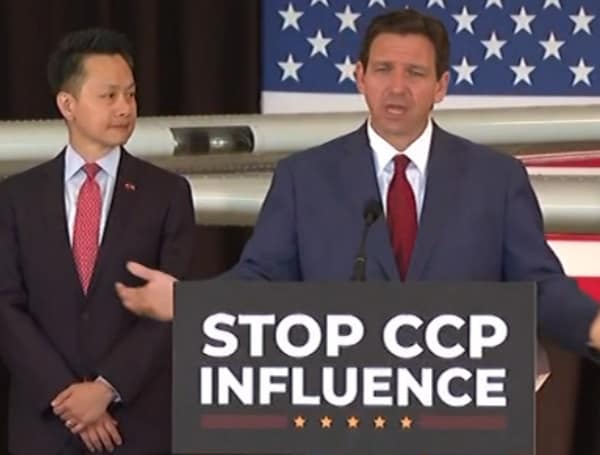Florida Gov. Ron DeSantis (May 8, 2023) Florida Gov. Ron DeSantis signed a bill that aims to restrict land ownership in Florida by people with tie
Florida Gov. Ron DeSantis signed a bill that aims to restrict land ownership in Florida by people with ties to the Chinese government.
“Today, Florida makes it very clear. We don’t want the CCP in the sunshine state. We want to make this as the free state of Florida, and that’s exactly what these bills are doing,” said DeSantis.
The Republican-controlled House and Senate voted last Thursday to pass a measure (SB 264) that, in part, would prohibit the sale of property within 10 miles of military bases and other critical infrastructure to interests tied to the Chinese government or other nations on a list of “countries of concern.”
The Senate voted 31-8 to pass the bill, with the House following a short time later in a 95-17 vote.
In the news: Florida Senate Gives Final Approval On Later School Start Times
While China is the primary focus of the bill, other designated countries of concern are Russia, Iran, North Korea, Cuba, Venezuela and Syria. The bill drew debate as some lawmakers said it could lead to lawsuit.
In September of 2022, Florida Governor DeSantis issued an executive order aimed at governments in China, Iran, Russia, Cuba, and “others hostile to American interests,” as he pointed to concerns about issues such as cybersecurity.
“I think we’ve stood strong against this type of ideology in a variety of ways, and this just continues us on that course,” DeSantis said during an event at Miami Dade College’s Wolfson Campus that focused heavily on China.
The executive order, in part, barred the state and local governments from procuring or using technology services that any federal agency has prohibited based on national-security concerns.
The order also directed the state Department of Management Services to take steps to ensure commodities and services used by the state and local governments are not susceptible to exploitation by “foreign countries of concern.”
In the news: Disney Monorail Inspections Cruising To Florida Gov. DeSantis’ Desk
“This will prevent the exposure of Floridians’ personal information and technology systems in Florida to foreign entities and bad actors,” DeSantis said.
DeSantis said he wants lawmakers to prevent the targeted countries from being able to purchase agricultural land in Florida and land surrounding military bases. DeSantis’ office cited “instances of Chinese Communist Party-affiliated companies purchasing land near military bases in other states, including Grand Forks Air Force Base in North Dakota.”
DeSantis also wants to expand a 2021 law that created new reporting requirements for entities seeking grants or contracts from the state.
The law requires state agencies and universities to report receiving gifts or grants “from any foreign source” valued at $50,000 or more. DeSantis wants to revise the law to bar gifts to Florida colleges and universities from residents, governments or other entities in countries of concern.
In the news: VIDEO: Migrant Surge Lines Up At Southern Border As End Of Trump-Era Title 42 Looms
Lawmakers approved changes in 2021 after high-profile Florida cases involving medical and academic researchers. Among the other changes, people “trafficking in trade secrets” would face second-degree felony charges for “trafficking in trade secrets,” with the charges raised to first-degree felonies if foreign governments benefited.
Lawmakers also required people and entities seeking state grants or contracts of more than $100,000 to disclose contracts, donations or grants linking them to China, Russia, Iran, North Korea, Cuba, Venezuela and Syria. State universities and other entities with research budgets of $10 million or more were directed to create “international travel approval and monitoring” programs.
Android Users, Click To Download The Free Press App And Never Miss A Story. Follow Us On Facebook and Twitter. Signup for our free newsletter.
We can’t do this without your help; visit our GiveSendGo page and donate any dollar amount; every penny helps.

